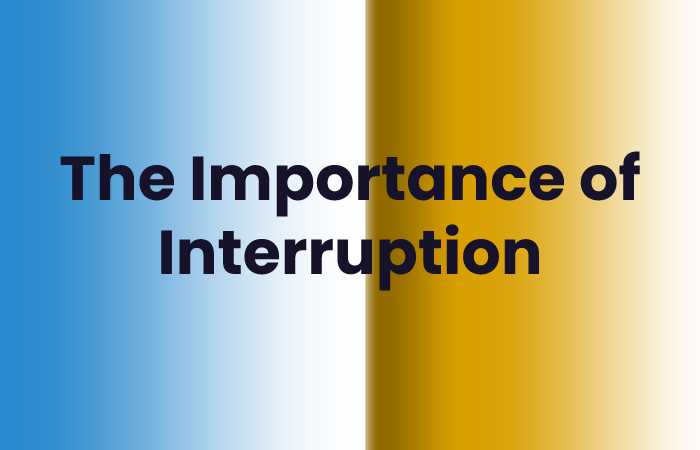Interrupted: An interrupted phrase is a word group that interrupts the flow of a sentence and is usually set off by commas, dashes, or parentheses. An interrupting expression is also called an interrupter, an insertion, or a mid-sentence interruption. The use of interrupting words, phrases, and clauses “confers a natural, spoken, informal feel to a sentence point of interruption, we lose our focus, and our growth stops.
Our courtesy is ripped away, our brain abruptly changes, our energy is gone and, with it, any feeling of approval. No substance how brief the interruption, no matter how quick the “Hello, how’s it going?” the damage is done. In fact, according to even, “Two seconds is long enough to make people lose the yarn.”
Table of Contents
Definition
The impact of interruptions cannot be overstated. They kill our thrust. When we jump again on our task, we can’t just pick up anywhere we left-hand off. We consume to reorient ourselves, re-immerse and re-gain our motion. Our recapture time depends on our task’s complexity, ranging from 8 minutes for more straightforward tasks to 25 minutes for more complex ones.
The Importance of Interruption

High performance is vital so that we can work with attention. We consume all had the experience of working on a job and opening to advance some energy. Our brain is wholly involved, we begin to get absorbed, and we sense an underlying feeling of excitement as we progress. And then Frequent interruptions can also be the principal to higher charges of exhaustion, stress-induced ailments, and replication of error rates.
Think of the impression you will have the next time you are attracted to disturb a colleague who is busily working away with a quick comment. Instead, pause. Stop yourself from controlling your impulse to blurt out a quick question or non-related comment; instead, save it for a more suitable time. Self-control isn’t rude; it can be one of the most respectful things you do. Trust me! Your colleague will thank you for it.
Is Active Listening Important
- Active listening is essential for two top motives.
- It helps you recollect and remember the information
- Active listening enables you to build a good understanding and relationship with the person you listen to.
- People generally appreciate adequately listening to and dislike it after the things they say hear enough, so cultivating active listening skills will help your personal or professional relationships.
When Is Not Interrupted Important?
- Always! Some examples of times when you power fall into the bad habit of disturbing include:
- Phone discussions
- Group work at school, college or university
- Team meetings at work
Here’s why it’s essential not to interrupted when you are actively Listening to Someone Talking
Active Listening
Active listening technique skills by therapists and therapists. But it can help you in all aspects of your life, from work to school to personal relationships. It is the act of entirely focusing on what says understanding it, responding to it if applicable, and remembering it in the future.
Many of us are poor listeners, and some people don’t understand the value and importance of active listening.
How to Engage in Active Listening
- Some of the critical basics of active attending include:
- Making eye contact with the utterer
- Possession your mind open to what someone is saying
- Waiting for the speaker to finish talking before skipping in with comments or inquiries
- Asking suitable questions to ensure thoughtful what it is your turn to speak
- Sympathy – that is, trying to put by hand in the shoes of the being who is speaking
The Benefits of Interrupted by Generations at Work
The adverse effects of work interruptions are difficulties moving ahead with tasks, time pressure, stress, and lower output. Managers often look for ways to remove or minimize such interruptions.
The adverse effects of these work interruptions, such as the difficulty of moving ahead with one’s tasks. And the resulting time pressure stress and lowered productivity documents. It is not surprising that bosses often look for ways to eliminate or minimize such interruptions. But the grades of our recent study indicate that there might also be an upside to these workplace interruptions.
The Community Side of Workplace Interrupted and its Benefits
You may need a miracle by others could be a good thing. The answer is that the knowledge of being may increase feelings of belongingness due to the interactions interrupter. Work interruptions have two aspects.
First, they get in the way of affecting work tasks, where the adverse effects happen. Forces to switch tasks due to interruptions repeatedly take a toll on employees’ energy and lower their job satisfaction. However, outside this task-based aspect interrupts by others also have social interaction with the interrupter.
Prior exploration has primarily ignored this social component, as the dominant conversation about interruptions has focused exclusively on their adverse, task-based effects. Our study, however, displays that employees may benefit from the social interactions that happen during these work interruptions.
Indeed, suppose we have learned one thing from social distancing and isolation last year. In that case, humans are inherently social beings with a critical need for social interaction. Research from social thinking suggests that the need for social connection and belongingness evolutionarily hard-wire and is an essential contributor to our psychological well-being
Be Mindful when Interrupting Others
Being watchful of the harmful and positive effects of work pauses can help workers achieve the suggestions of interrupting others. They need to be aware of two belongings. First, they need to be cautious not to interrupt others too regularly, causing the other to constantly switch their attention from one task to another, which can be draining. Thus, the first way watchful when interrupting others is to interrupt only when need to do so.
Second, in light of the benefits of the social aspect of work interruptions, to the extent that one must interrupt others, one can work in at least some level of small talk during the work interruption. In this way, what may seem like wasting time may be opportunities to connect and enhance employees’ sense of belonging and job satisfaction.
Indeed, recent research on small talk in the workplace has highlighted the benefits of this behaviour (Method et al., in press). We found that interruptions with a more fantastic social element were more strongly related to feelings of belongingness than those mainly task-focused.
Conclusion
Overall, work interruptions through others in the workplace were the inspiration killer they made. It may be helpful to, within limits, inspire rather than discourage such interruptions in the workplace, given the inevitability of work interruptions in today’s dynamic. In workplaces and the possible beneficial effect of these interruptions, we call on managers to bring a fundamental shift in the way they view these workplace amounts.
Rather than viewing work interruptions as undesirable actions that need eradicate. We call on managers to focus on better management of work interruptions to reduce their adverse. Effects and enhance their positive impact on employee well-being.

